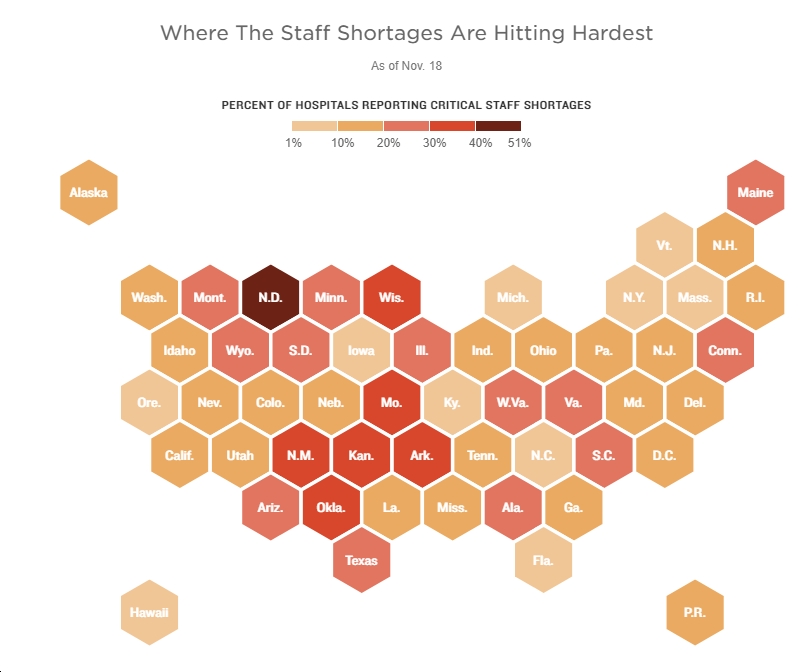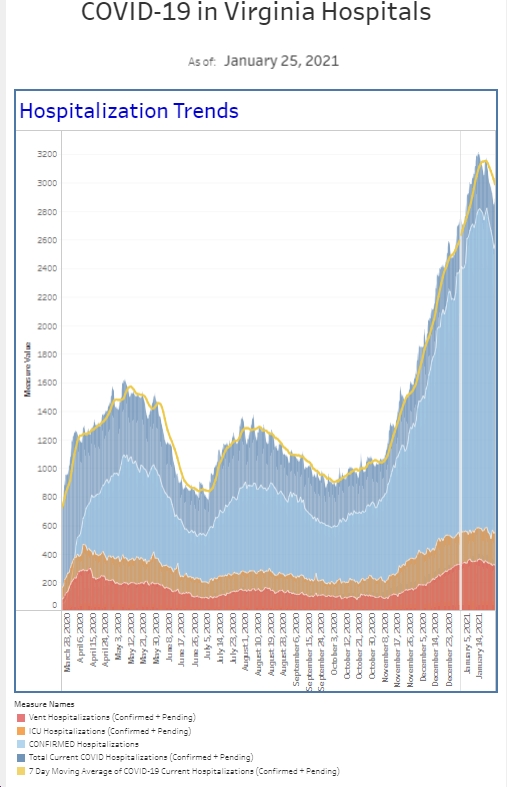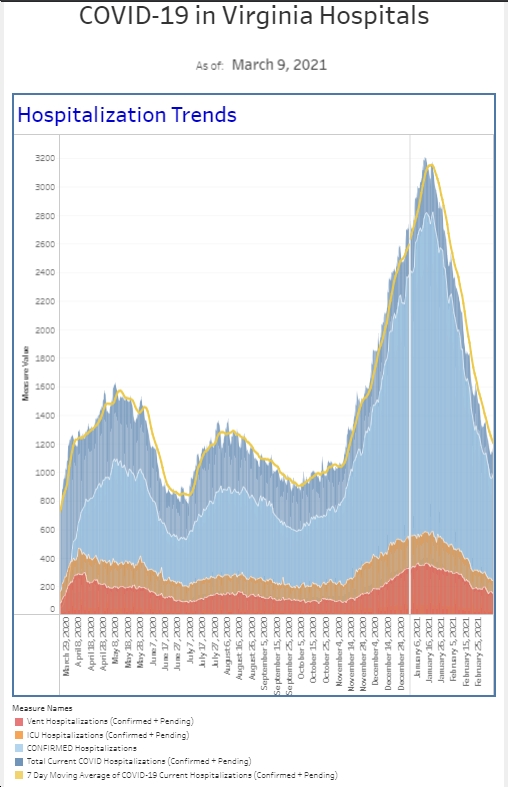By Kellen Squire; cross-posted from Daily Kos
Like clockwork- almost rote at this point.
Patient comes into the ER. Months of notes from their primary care physician (PCP) trying to get them vaccinated. They steadfastly refuse. Get COVID. Try every home “treatment” available. Decompensate. Show up in the ER, panicked. We stabilize them.
But it’s too late.
They show up wanting Regeneron- the “vaccine bad, fetal-cell derived synthetic antibodies good” rationale is a tough one- but it’s too late. Or they have the Omicron, which Regeneron doesn’t work for anyway.
They continue to decompensate. Go to the COVID unit. Then to the ICU. Then they get intubated.
And then – well…
Again, I’ve seen people chuckle at the schadenfreude they experience watching people “earn their Herman Cain Award“, but I assure you nobody in healthcare feels that way.
I’ve seen the frenzied horror on people’s faces when they understand what’s happening.
That it’s too late.
Sigh.
The Omicron isn’t “just a cold,” particularly to unvaccinated people. Stupid that people want to think that. “Oh, South Africa is past their peak!” What, the South Africa that is in the middle of their summer, with mask mandates and restricted gathering sizes? Yeah. We’re gonna be exactly like South Africa.
Omicron is potentially as infectious as the measles, so I don’t see how we don’t all get it now. Sure, it might not be as bad as the Alpha or Delta… but if enough people get it, heh, I’m not sure it’ll make much of a difference to a healthcare system that’s already shattered.
I just pray we make it through. Not sure we can do much else at this point.
A colleague vented to me recently. Charge nurse of a busy ER; six hour waits to see a doctor minimum. A patient in the waiting room had nausea and vertigo, but was otherwise fine and stable. Still, something nagged at them. Nagged and nagged and nagged. They didn’t have time to dwell on it; they had patients sick and dying, and were flooded with COVID patients- most not really sick enough to come to the ER, but we in the ER can’t (and won’t) turn anyone way. Even if federal law didn’t require us to, we wouldn’t. If we turned away a hundred people and ninety-nine were fine, the one we missed…
Anyway. Even so, something just sat wrong. Call it a gut instinct. So they grabbed the patient, put them in a wheelchair, and told the ER doctor as they rolled by him in the hallway to put in an order for a head CT scan, now, because they were taking that patient over immediately.
Which is good, because that patient was having a massive head bleed, with what we call a “midline shift”- meaning there was so much blood in their head it was pushing their brain all the way against the other side of their skull. In fact, they ended up having to bore a hole in the patient’s head, right there in the ER.
Sure, it was experience and training on what to look out for that saved the day there. I won’t discount that. But it was also an enormous amount of luck that kept that patient from seizing and dying on the floor of the waiting room that day. And the thing about luck is that, eventually?
It runs out.
People want to go back to normal. I get it. I absolutely do. I do, too. Colorado Governor Jared Polis (D) recently summed this up, saying that “people need to get on with their lives. This has been two years of it. People are only on this planet for 70 to 80 years. Kids missed out on social activities in school, seniors in senior centers missed going out to movies…” And I say, absolutely. No doubt.
The only problem is that the people who make those kinds of proclamations of “wanting things to go back to normal” seem to share a common attribute: they want someone else to pay the price to make that happen.
Governor Polis isn’t one of these; he seems to recognize the cost, as recently Colorado announced that because of unvaccinated COVID patients, hospitals were authorized to turn people away from ERs. So he’s saying aloud to everyone – we’ll open up, sure. But people might die from it. But there is an enormous number of people who want that response, and to have anyone but them pay the cost. Enumerating this would require a long list, including everyone from Nate Silver to Ron DeSantis.
And I say, fine. Open everything up. No restrictions. But then give us the resources we need to tackle that problem. And, yet, there’s the rub. Because giving us the resources we need to actually tackle that problem would show the depth and magnitude of the problem we’re facing. And nobody is willing to reckon with that right now.
It’s like the men and women we sent to Afghanistan and Iraq: for two decades, we gave them an impossible mission, knowing they couldn’t accomplish what we sent them there to do. We burned through the very people who were valiant enough to put themselves in harm’s way for our country. And then completely ignored them. Aside from a few feel good “heroes!” gestures to make us feel better about ourselves, we ignored them. “It can’t be that bad!” But unless you were related to a service member, or it involved your life somehow, it was highly unlikely you paid any attention to- or cared a single whit- about what went on there.
That detachment is a cognitive necessity, I suppose. Because then, when something goes wrong, it can be the fault of anyone and everyone else. Not the people in charge. Not the people who championed it. Anyone and everyone else.
If someone dies on the floor in my waiting room, it’s my fault. Not the fifty patients waiting with mild COVID symptoms clogging up my ER. Not the half of my staff who are out with COVID. Not the scores of experienced providers who quit in the wake of successive COVID waves after realizing they could find a job where they didn’t get their asses absolutely beaten, day in and day out.
When Nate Silver clicks his tongue about COVID, I imagine him as a part of an after-incident inquiry. “Well, the numbers said hospitalizations were lower in this wave. And all the signs were there; really, it’s quite obvious in hindsight. ‘Busy’, ‘overwhelmed’, these are just excuses to keep COVID restrictions in place. I have a statistical analysis here showing how things are in South Africa. So, really, it’s your fault that person will never go home to their family.”
When Ron DeSantis cheers about his COVID response, I can hear the subtext in his speeches. “The EMTs, firefighters, ER and ICU staff of Florida did absolutely nothing to help us through this crisis. ‘Overworked’, bah. If anything, they’re all a bunch of whiners. I mean, I certainly never had a problem being able to see a doctor. No, it was me- and me alone- that got Florida through COVID. The people who died would have almost certainly died at some point in the next few decades, anyway.”
Over the last two years, the number of experienced providers we’ve bled has been catastrophic. Turns out that abusing the hell out of your most talented folks, asking them to save a country whose own government seemingly has no interest in protecting, is bad for morale. I’ve been an emergency department nurse for eleven years now, and in pediatric acute care before that- but when I started in emergency services, that pedigree might’ve been good for the 50th percentile rank in professional experience.
Now? That might be good enough for “most experienced” at a startling number of emergency departments nationally. Or near enough to it as to not matter much. And that kind-of brain drain matters. That patient I mentioned earlier, saved by the intuition of an experienced nurse? The more experience we lose, the more of those kinds of patients we lose.
And when we are flooded with anything- COVID, flu, hell, even paper cuts for that matter- when we are inundated, we rely on those kinds of people to cut the wheat from the chaff and save people’s lives.
I don’t know if we have enough left to make it through this surge. If we do, I suspect it’ll be barely. And afterwards, like a drunk who drives home successfully, I imagine people will shrug and go, “See? No big deal. ‘We’ made it through to the other side!”
But my concern, as always, is with my people. My fellow emergency services providers. The people in my community. They’re not numbers. They’re not statistics. What happens to them matters.
Now, though… all we can do is wait.

















